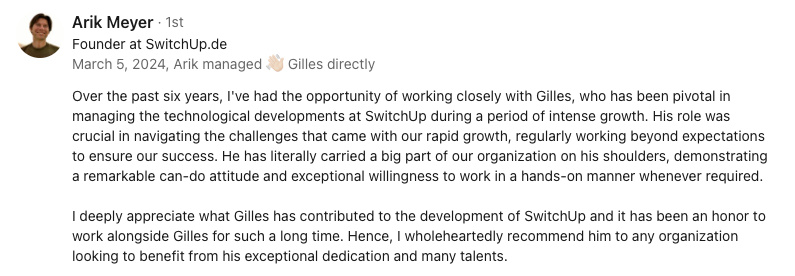Abstract:
The article explores how startups can effectively navigate big data analytics using open-source tools like Apache Superset, Metabase, and Kibana, which allow for cost-effective data insights without requiring extensive technical expertise. These platforms democratize data access, enabling teams to make informed decisions and save on budgets, which can then be redirected towards other growth areas. The article highlights the use of public and crowd-sourced data by companies such as Komoot and Breeze Technologies to foster innovation while maintaining low costs. It also underscores the importance of collaborative environments, like tech hubs and academic partnerships, which provide startups with fresh perspectives, advanced research methodologies, and talent development opportunities. Despite challenges like technical demands and security concerns, open-source tools, incremental implementation strategies, and cloud-based solutions offer scalable and adaptable analytics options for startups aiming to build robust systems without straining resources.
Navigating big data analytics can be tricky, especially for startups that need insights without spending a fortune. Thankfully, open-source tools are making analytics more accessible. With platforms like Apache Superset and Metabase, creating dashboards and exploring data is possible without needing a team of experts. These tools not only save money but also encourage everyone on the team to get involved with data, promoting informed decision-making. However, using open-source tools can also come with challenges like technical and security concerns.
Leveraging Open-Source Tools for Big Data Analytics
Popular Open-Source Analytics Tools
Startups often want strong analytics but don't have big budgets. Open-source tools like Apache Superset help by allowing startups to build dashboards and analyze data without needing much coding experience. Apache Superset's easy interface makes it simple for businesses to see and understand data, helping those without technical knowledge. Tools like this give more companies access to data insights that were once only for tech giants.
Metabase takes things a step further by making analytics even easier. Its simple interface means anyone on the team can use it without needing tech skills. This approach spreads data understanding across the team, allowing for informed choices without high costs. Metabase is also affordable, letting startups spend their budget on other important areas while still benefiting from data insights.
While Metabase is all about simplicity, Kibana offers advanced data visualization, especially for startups needing real-time analysis. Kibana helps present data in a way that supports quick business decisions, helping startups spot trends and make proactive strategies. However, European startups must navigate unique challenges, like adhering to EU-specific regulations, when using these tools.
Advantages and Challenges of Open-Source Tools
One major benefit of open-source analytics tools is the cost savings. Startups can cut expenses by using tools like Apache Superset and Metabase, which don't have licensing fees. This allows them to invest in growth areas like expanding their market or improving products. This financial flexibility can make a big difference in the competitive startup world.
- Cost Savings: Open-source tools eliminate licensing fees, allowing startups to allocate funds elsewhere.
- Technical Skills Requirement: Implementing and customizing these tools often require technical expertise, which can be a hurdle for startups without tech experts.
- Security Concerns: Community-driven tools might not have the same security as proprietary software, requiring startups to keep them updated with the latest security patches.
Harnessing Public and Crowd-Sourced Data for Startup Growth
Harnessing Public Datasets
Startups like Komoot show how using public datasets can drive innovation without high costs. By using OpenStreetMap's detailed maps, Komoot offers users great hiking and cycling routes while saving resources for other innovations.
In the environmental sector, startups like Breeze Technologies use public datasets to improve their offerings. By using air quality data from the European Environment Agency, Breeze Technologies provides cities with insights for better urban planning and public health.
Datawheel is an example in the economic field, using Eurostat data to create dashboards that provide critical economic insights. These dashboards help decision-makers craft informed strategies, showing how public data can bridge the gap between complex information and practical intelligence.
Leveraging Crowd-Sourced Data
Crowd-sourced data is a great resource for startups looking to improve services and grow. BlaBlaCar, a ride-sharing platform, uses user-generated data to improve its services and enter new markets effectively.
Streetbees uses crowd-sourced data for market insights, collecting real-time consumer feedback to offer businesses deeper understanding of consumer behavior.
OpenStreetMap is a prime example of crowd-sourced data, where global contributions enhance geographic data. This collaboration provides valuable data for startups in logistics and navigation, illustrating how collective efforts build solid datasets for various applications.
Collaborative and Community-Driven Analytics
Role of Tech Hubs and Communities
Tech hubs in Europe are boosting collaboration and innovation. Co-working spaces like Station F in Paris are vibrant places where startups share resources and ideas. These environments encourage growth and experimentation, where networking naturally happens, opening new opportunities for startups.
Hackathons are another way tech hubs promote collaboration. They provide a platform for brainstorming and testing ideas in real-time, often leading to innovative solutions. The practical experience gained here sparks creativity and results in fresh perspectives.
Digital platforms like Slack and GitHub help with communication and data sharing among community members, breaking down geographical barriers and speeding up project development.
Case Studies of Collaborative Projects
Zalando shows how collaborative techniques can enhance recommendation systems, improving customer satisfaction and boosting sales. This highlights the power of shared expertise in turning data into actionable insights.
TransferWise collaborates with universities to optimize currency conversion processes, using academic research tools to improve service efficiency and position itself as a fintech leader.
BlaBlaCar works with data scientists to enhance user retention, using advanced analytics to improve service reliability. These examples show how partnerships and shared knowledge drive success in the startup world.
Academic Collaborations: Unlocking Synergies for Startups
Benefits of Academic Partnerships
Partnering with universities allows startups to access the latest research and methodologies, which can transform their analytics approach. Universities are centers of innovation, offering insights that are often ahead of industry trends. This helps startups implement advanced tools and gain a competitive edge.
These partnerships also help with talent development and recruitment. Universities are full of bright students eager to apply their skills. Startups can offer internships and projects, gaining new ideas while helping students gain real-world experience.
University partnerships also boost a startup's credibility, which is crucial during funding rounds or entering competitive markets. Working with academia encourages experimentation and innovation, keeping startups at the forefront of technological advancements.
Challenges of Partnering with Academia
Startups face challenges when working with academic institutions, such as managing intellectual property. It's important to establish clear agreements to ensure fair benefits from joint innovations.
Aligning goals and timelines can also be tough, as universities and startups often have different schedules and objectives. Close collaboration and realistic expectations are key to meeting both short-term and long-term goals.
Cultural and operational differences can impact collaboration success. Open communication and flexible project management help bridge these gaps, allowing both parties to benefit from each other's strengths.
Innovative Cost-Management Strategies
Strategies for Cost-Effective Analytics
For startups, using open-source tools like Apache Superset and Metabase can save money and provide functionalities similar to proprietary solutions. This lets them invest in other important areas.
Cloud-based solutions with pay-as-you-go pricing offer flexibility and scalability, allowing startups to pay only for what they use. This adaptability helps manage costs while staying agile in a fast-paced market.
Starting with a minimal viable product (MVP) lets startups test and refine analytics processes without spending a lot. This approach helps make improvements based on real-world feedback.
Incremental Implementation of Analytics
Startups should start with clear objectives and key metrics to ensure analytics efforts align with business goals. This clarity helps focus resources and ensures team alignment.
Setting up basic data collection and storage is the next step, providing the groundwork for meaningful insights. Reliable storage systems ensure data is secure and accessible for analysis.
As startups grow, integrating advanced analytics becomes important. Gradually introducing sophisticated tools allows deeper insights and informed decision-making, giving startups a competitive edge.
The journey into big data analytics for startups can be simplified and cost-effective with open-source tools like Apache Superset, Metabase, and Kibana. These platforms not only cut costs but also empower teams to make informed decisions by democratizing data access. Startups can harness public and crowd-sourced data to drive innovation, as demonstrated by companies like Komoot and Breeze Technologies. Collaborative environments and academic partnerships can further enhance analytics capabilities, providing fresh perspectives and expertise. By embracing incremental implementation and focusing on clear objectives, startups can gradually build robust analytics systems without straining resources.














